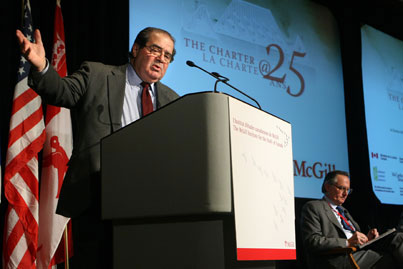A quarter-century of rights, freedoms and controversy
A quarter-century of rights, freedoms and controversy McGill University
User Tools (skip):

U.S. Supreme Court Justice Antonin Scalia (speaking) and Canadian Supreme Court Justice Ian C. Binnie engage in a verbal sparring match over the role of the courts and activist judges in a constitutional democracy at The Charter @ 25 conference, hosted by the McGill Institute for the Study of Canada.
Owen Egan
A quarter-century of rights, freedoms and controversy
The Charter @ 25, hosted by the McGill Institute for the Study of Canada, was billed as the definitive conference on the subject – not a celebration of the Charter of Rights and Freedoms as it reaches the quarter-century mark so much as a real assessment of the highs and lows the Charter has precipitated. The nearly 300 participants, who filled the Omni Mount Royal for three days beginning Feb. 14, were not disappointed.
The conference kicked off with "Deal or no Deal: the Making of the Charter" — a spirited exchange among some of the key players in the constitutional saga of the early '80s, three of whom were "in the room" – in this case a late-night suite at Ottawa's Chateau Laurier -— when the final deal was cut, and one who, famously, was not.
Eddie Goldenberg was Special Constitutional Advisor to Justice Minister Jean Chrétien on that fateful night, while Thomas Axworthy was a key strategist for Pierre Trudeau.
Senator Hugh Segal was also among the group, reliving his role as a senior aide to then Ontario Premier Bill Davis.
The fourth panelist was Louis Bernard, who was Secretary General of the Conseil Executif under René Lévesque's PQ government, which wasn't invited to the party it later dubbed "The night of the long knives."
Segal contended that story is a romanticized version of events, asserting that a proper understanding is "instructive in terms of what actually happened, as opposed to what the myth-makers would wish us to believe happened."
Bernard presented his own recollection of how his province had been treated by those who had "reneged on their signature and betrayed their ally." And subsequently, he added, "Not so much as an apology. Not even any recognition of the plot."
With that, the tone was set for the entire conference. It would be an exhaustive and vigorous appraisal of all the Charter has brought us in the last 25 years – the good as well as the bad.
There were closing fireworks as well when a wittily self-deprecating Bob Rae moderated a debate that pitted Mr. Justice Ian Binnie of the Supreme Court of Canada against Mr. Justice Antonin Scalia of the U.S. Supreme Court in a clash over the role of judges and judicial activism in a constitutional democracy.
Binnie defended the importance of judges interpreting laws in their own time: "The ability of the courts to move with the times has served this country very well."
Scalia retorted that such a position "simply encourages judges to make anti-democratic decisions that extend rights to questionable groups such as bigamists and pederasts."
With the recent Supreme Court decision on security certificates and ongoing debates over reasonable accommodation and a host of minority rights issues, who knows where the Charter is headed?
What was clear by the end of the Charter@25 was that no other piece of legislation possesses such power to evoke the passions of the citizens of this country.

